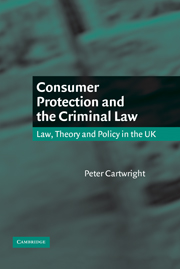Book contents
- Frontmatter
- Contents
- Preface
- Acknowledgements
- List of abbreviations
- 1 Consumer protection rationales
- 2 Techniques of regulation
- 3 The role of criminal sanctions in consumer protection
- 4 The use of the criminal law
- 5 Consumers and safety: the protection of physical integrity
- 6 The protection of economic interests
- 7 The enforcement of regulatory consumer law
- 8 Conclusions
- Index
3 - The role of criminal sanctions in consumer protection
Published online by Cambridge University Press: 24 June 2009
- Frontmatter
- Contents
- Preface
- Acknowledgements
- List of abbreviations
- 1 Consumer protection rationales
- 2 Techniques of regulation
- 3 The role of criminal sanctions in consumer protection
- 4 The use of the criminal law
- 5 Consumers and safety: the protection of physical integrity
- 6 The protection of economic interests
- 7 The enforcement of regulatory consumer law
- 8 Conclusions
- Index
Summary
Introduction
In the previous chapters, it was argued that the civil law plays an important role in the protection of the consumer, but suffers from limitations which make intervention from the state desirable. English law has tended to use the criminal sanction as the prime method of protecting the consumer, with the creation of new offences a frequent response to consumer problems. This chapter examines the place of the criminal law in society, with particular reference to regulatory offences and consumer protection. It begins by examining when conduct is properly classified as criminal, and when conduct should be classed as criminal. It then considers the main theories of punishment, and thereby seeks to explain what criminal law seeks to achieve by punishing the defendant. Finally, the chapter considers the extent to which there is a separate category of law, known as regulatory crime, and the extent to which consumer law is part of such a category.
When is conduct criminal?
There are two important questions which are sometimes confused by commentators: first when is something criminal, and secondly when should something be criminal? As Smith and Hogan have commented, ‘writers who set out to define a crime by reference to the nature of the act … inevitably end by telling us, not what a crime is, but what the writer thinks it ought to be; and that is not a definition of a crime’.
- Type
- Chapter
- Information
- Consumer Protection and the Criminal LawLaw, Theory, and Policy in the UK, pp. 63 - 86Publisher: Cambridge University PressPrint publication year: 2001



